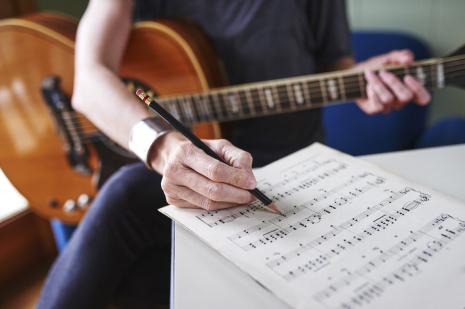
SONGWRITING & COMPOSITION
Workshop your songs in a safe, encouraging environment…
- Have you ever had something happen and thought: “there’s a song in that!”
- Have you ever written a song and got stuck after the first chorus? (‘2nd verse syndrome’)
- Do all your songs sound the same?
- Are you great at writing music, but fall short when it comes to the lyrics?
- Do you need help setting your lyrics to chords, or arranging your songs?
It’s said that songwriting is 10% inspiration and 90% perspiration. How to get that magical, inspired idea to take shape and delight others as much as it delights you? Learning the craft of songwriting – the role of lyrics, melody, form, harmony and groove – will equip you with the tools you need to take your song from incubation to celebration!
SIGHT–READING
Imagine being able to read music like you were reading a good book…
- Longing to read music, but finding it difficult?
- Frustrated by all those sharps and flats in the music?
- Trying to keep up when the choir reads the music by sight?
- Can read the notes, but need to improve your rhythm?
- Memorised how to play your favourite piece, but forgotten it already?
Learning to read music takes time, just like learning any language, but once you can do it, a whole world of music is yours to explore. Carefully graded sight-reading exercises can take you slowly, but surely, to a place where you’ll never forget how to play your favourite pieces!
MUSIC THEORY:
Understand how music works and perform with confidence.
Learn about…
- The underlying elements of music (melody, harmony, rhythm, texture, timbre and form) so you can make your own music.
- Music notation and terminology (how the language of music is written), and why it isn’t always straightforward/logical, to help you read and write music.
- How to identify the elements of music in your pieces to improve your pitching, performance and interpretation.
- AMEB Exams: Theory of Music, Musicianship and Music Craft.
- Sing in tune
- Memorise music quickly
- Improvise with confidence
- Learn how to play music by ear
- Strengthen your sense of rhythm and timing
- Develop the ability to hear multiple notes at the same time
When you understand music theory, you have a set of tools to help you learn, master, interpret and deliver your pieces with style!
AURAL (EAR) TRAINING
Learn how to hear music and understand what’s going on.
Aural training is fun, and can really boost your music performance. Aural classes help you to make a link between the theory of music and the sounds you are making. When you can hear the underlying elements in the music (notes, intervals, scales and chords) you have so much more control and confidence!

